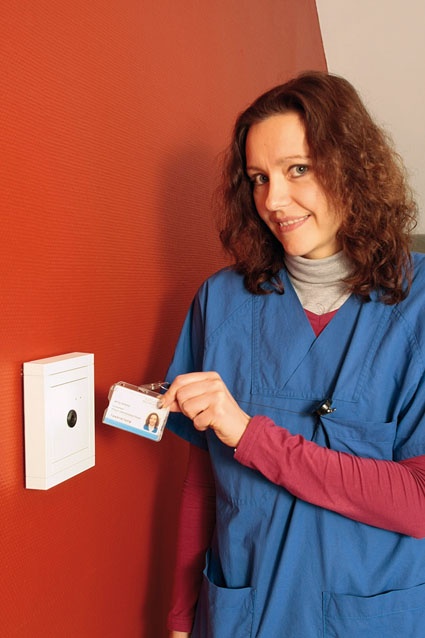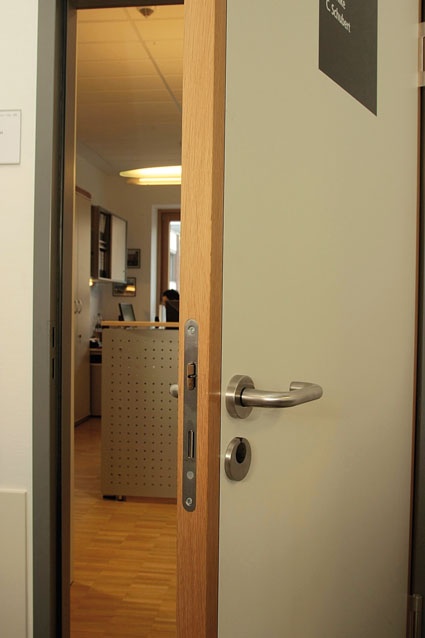Access Control: Main Building Secured in Record Time
Once the contract was awarded, it only took three months to put a new electronic locking system into operation at Klinikum Kassel in central Germany. During this short period of ti...


Once the contract was awarded, it only took three months to put a new electronic locking system into operation at Klinikum Kassel in central Germany. During this short period of time, a main building was equipped with Winkhaus blueChip technology and locking plans were produced for the complex and its approximately 850 employees. Effective cooperation between all project participants ensured that work was completed without any hitches.
With its associated operational units, Klinikum Kassel is one of the largest hospitals in Germany under local government ownership. The owner is Gesundheit Nordhessen Holding AG, a regional healthcare company which supplies almost 68,000 patients with a complete range of outpatient and inpatient care, covering almost all possible medical and nursing services. Gesundheit Nordhessen Holding AG operates six hospitals: Klinikum Kassel with the Park Schönfeld Children's Hospital, the local district hospitals in Hofgeismar, Helmarshausen and Wolfhagen, and Bad Arolsen Hospital. The provision of services is made complete with two rehabilitation centres, the SWA outpatient nursing service and the Lindenberg and Fasanenhof sheltered accommodation centres for the elderly.
With a workforce of around 4,700, the holding is one of the largest employers in the North Hessen region and offers superior quality healthcare services. Significant investment has recently been made in emergency medical services. A new main building has emerged which houses both admissions and diagnosis. A new women's, mothers' and children's hospital is also currently being built in Kassel's Mönchebergstrasse and is scheduled to open in early 2012.
Card-based System
The new main building and the surgical hospital in Kassel received a Winkhaus electronic locking system in 2010. Other buildings are gradually being fitted with the system, as their existing systems can no longer be upgraded and incur high costs when keys are lost.
"The executive board initiated the investment," states Thomas Bäcker, Project Manager from Gesundheit Nordhessen's Central HR Department. "We have changed our access system over to cards to increase the level of security in the complex," explains Bäcker. "We now work with hybrid cards which contain three chips in addition to a pass photo." Two RFID chips and a contact-based chip cover all the required functions and can also be put to other uses in the future. Employees' cards not only open doors in the hospital, but also unlock changing room lockers and safety deposit boxes. The contact-based chip serves as an identification medium and will also allow PC users to carry out their duties on different computers in the future, enabling them to take their work to any computer.
Employee ID photos are produced in the hospital's own photo studio and then printed onto the card. Different colour bars classify staff according to their field: red signifies medical staff and blue represents employees who provide direct care to patients, while service staff wear green bars. This colour coding system enables patients to easily identify the people they need to speak to. As patients rarely have contact with administrative staff, office staff cards are neutral.
Future-proof Technology
"The executive board had a very clear idea of what the new technology should provide," recalls Bäcker. In addition to future viability and user-friendly operation, system specifications also required a passive operating system. "To ensure greater flexibility and safety, we decided on offline technology with a virtual network," adds Winfried Neurath from Gesundheit Nordhessen's Central Building and Technology Department. "We started to take a good look around the market in early 2009 and came to the firm conclusion that Winkhaus's blueChip was the best to meet all these requirements," recalls Neurath.
Easy to Use
The hospital's virtual network currently consists of 25 online booking readers, 7 offline readers, 103 double knob cylinders and 690 intelligent design door handle sets (EZK). The EZK sets are a joint product development by renowned manufacturers FSB and Winkhaus and particularly impress thanks to their minimalist, beautifully shaped design. There are no protruding or affixed parts to spoil the doors' sleek appearance, as their high-performance, electronically-controlled reader units linked to mechatronic coupling elements are concealed in a tiny space in the rosette and are scarcely visible from the outside. The contactless system recognises an identification medium when it is brought near to the reader unit. The same applies to the blueChip double knob cylinder which employees use to open sliding doors. Here too, employees only need to hold their cards in front of the double cylinder for the door to unlock.
Equally convenient access is also provided to special department sections such as Intermediate Care. Entry is gained via online booking readers which combine timeLine AccessPoints with access control functions. Four of them have been installed at the entrances to these areas as electronic doormen. This entry process is both easy and effective. On entering the department, employees hold their blueChip card against the timeLine
AccessPoint, which forwards the data to a central computer. If an authorised blueChip card is detected, the automatic door opens.
These four units and the other twenty-one timeLine AccessPoints also carry out other tasks in the background to ensure convenient management of the blueChip locking system. Employee cards assume an important role in this process, because they feature locking authorisations for a great many doors. When an access is booked using an employee card, an expiry period of a few hours is automatically programmed instantly. The advantage is that once a locking procedure is recorded on the central computer, these cards are then authorised to lock inside doors within the programmed time period only. This means that even if a card authorised for use on all doors has been lost, there is no longer a need to go and block its usage from individual doors manually.
All changes to locking authorisations on individual cards are instantly and conveniently programmed in the same way when access is booked. Employees thus no longer need to go to a central point at a certain time to receive their access authorisation updates, as updates are automatically transmitted to their cards when they enter the building.
Central Control
The entire electronic locking system is controlled by a central computer. Tasks which involve considerable time and effort in a mechanical locking system are quickly completed with blueChip by just pressing a few buttons on the computer keyboard. If an employee reports the loss of a key, it is quickly blocked from the system on the computer by the employee responsible in Gesundheit Nordhessen's Building and Medical Technology Department, Michael Winterstein. He is also able to manage lock authorisations just as easily. "I was sceptical at first," says Winterstein, who already has experience with other electronic locking systems. "However, Winkhaus Software blueIntras Control provides assistance with a very intuitive user interface." It also made it easy for him to produce the locking plans for the roughly 2,500 employee cards currently in use.
Reliable Partners
Winkhaus Key Account Manager Heiko Marker and Thomas Schier from Karl Kipping GmbH are ready to provide assistance to Mr Winterstein and his colleagues with any questions that they may have regarding the system controls or the hardware. Alsfeld-based fitting specialist Kipping installed the entire system. In existence for almost 100 years, this firm employs a workforce of over sixty and is certified in accordance with DIN ISO 9001. In cooperation with Winkhaus, the Alsfeld security experts have installed locking systems in police buildings, hospitals, city council buildings and company premises in the region.
Customised Solutions
"I am consistently very satisfied with our good partnership with Winkhaus and Kipping," states Winterstein, who is fully aware that this is the very reason why the project was completed so quickly. "These two project partners took our proposals and ideas on board and provided tailor-made solutions."
"We first developed a few features in the system together with the others involved in the project during the implementation stage, as it wasn't possible to envisage everything that was required. He cited toilet doors as an example: "The intelligent door handle set ensures that visitors cannot enter employee toilets; however, it does not allow the doors to be locked manually on the inside. Kipping employees found an effective solution for this problem. In addition to the electronic rosette, they also installed a mechanical lock which shows on the outside whether the toilet is free or not. While working on the project, the team also gave some thought to security in the patient rooms. Selected single rooms will shortly receive an electronic door handle set, which the patient will be able to operate using a blueChip key fob. This prevents unauthorised persons from entering the room when the patient is absent.
Business Partner
Aug. Winkhaus GmbH & Co.KGAugust-Winkhaus-Str. 31
48291 Telgte
Germany
most read

Is Your Venue Ready for Martyn’s Law?
Martyn’s Law demands stronger security by 2027. Is your venue prepared to protect and respond?

Assa Abloy's battery-powered Aperio KL100 secures lockers
Boost workplace security and operational flexibility by securing more than just doors.

Safety and Security in an Emergency: How companies take responsibility with strategic personal protection and amok prevention
Personal protection & amok prevention: strategic concepts, training & responsibility for corporate safety and security


Integrated and Futureproof: Traka’s Next Chapter
Interview with Stefni Oliver on Traka’s Vision for the Future







